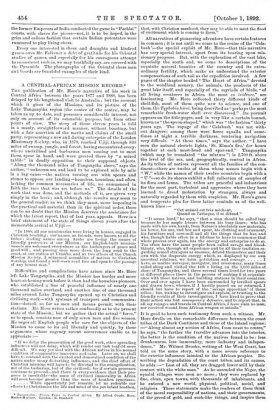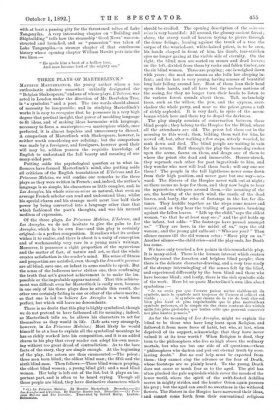A CENTRAL-AFRICAN MISSION RECORD.*
THE publication of Mr. Hore's narrative of his work in Central Africa between the years 1877 and 1888, has been delayed by his lengthened visit to Australia ; but the account
which it gives of the Missions, and its picture of the Lake Tanganyika region (the centre of the centre), may be taken as up to date, and possesses considerable interest, not only on account of its ostensible purpose, but from other points of view. The story of those eleven years is told in a manly, straightforward manner, without boasting, but with a fair assertion of the merits and claims of the small party, representing a new and daring enterprise of the London Missionary Society, who, in 1878, reached Ujiji, through 836 miles of swamp, jungle, and forest, having encountered every- where uncivilised and barbarous men coming out to meet them, spear in hand, and were greeted there by "a mixed rabble" in deadly opposition to their supposed objects. "Along the thousand miles of Tanganyika shore," says the author, " unknown sea and land to be explored mile by mile in a log canoe—the natives turning out with spears and stones to oppose our landing—homeless, houseless, and often lacking the common necessaries of life, we commenced in faith the race that was set before us." The details of the work that was done, and the methods of it, are given very simply in the book ; and, although the results may seem to the general reader, as we think they must, more imposing in the practical and material than in the spiritual order, there can be no doubt that the Mission deserves the assistance for which the latest report, that of last year, appeals. Here is a brief statement of the state of things eleven years after the memorable arrival at Ujiji
" In 1888, all our missionaries were living in houses, engaged in Christian teaching ; our names, as friends, were known to all the tribes ; leading names among Arabs are to-day the names of friendly protectors of our Mission ; our English-built mission- vessels are welcomed everywhere as the harbingers of peace and good-will ; and passing once more down the long road to the coast, at our station at Urambo, and at two others of the Church Mission Society, I witnessed assemblies of natives to Christian worship, and found a well-worn road free and open to the passage of any honest man."
Difficulties and complications have arisen since Mr. Hore left Lake Tanganyika, and the Mission has harder and more
heart-sickening work before it than had the houseless pioneers, who established a line of peaceful influence of nearly one thousand miles overland, and another line of one thousand miles around Lake Tanganyika opened up to Christian and civilising work—with systems of transport and communica- tion—dotted, so far as men and means permit, with their stations. Mr. Hore writes rather confusedly as to the present
state of the Mission; but we gather that the actual "force," so to speak, consists now of only seven men and five women.
He urges all English people who care for the objects of the Mission to come to its aid liberally and quickly, by these
arguments whose cogency recent occurrences enable us to appreciate :-
" If we delay the prosecution of the good work, other spreading influences will not delay, which will render our task tenfold more difficult. We may yet deal with the African native in his normal condition of comparative innocence and calm. Later on, we shall have to contend with the excited and demoralised condition of the native under many di-turbing influenees, and the chief effort of Christian missions will have to be directed to the evangelisation, not of the barbarian, but of the civilised; for if certain processes continue to proceed—and there is every evidence that their pro- gress is inevitable—the mass of civilised immorality in Africa will soon become greater than the mass of heathen ignorance.
While opportunity yet remains, let us redouble our efforts to Christianise the life and mind of the yet infant heathen,
Tanganyika : Eleven Years in Central Africa. By Alfred Coode Hore, Master-Mariner. London : E. Stanford.
that, with Christian manhood, they may be able to meet the flood of excitement which is coming to them.
All narratives of pioneering adventure have certain features in common ; it is not until we come to the cruise of the Cala- bash'—the special exploit of Mr. lore—that this narrative has very special interest, apart from its bearing upon mis- sionary progress. But, with the exploration of the vast lake, especially the south end, we come to descriptions of the exquisite natural beauties of the country and its extra- ordinary fertility, which make us understand the exterior compensations of such toil as the expedition involved. A few pages of the chapter headed " The Heart of Africa," devoted to the woodland scenery, the animals, the products of the great lake itself, and especially of the myriads of birds, "of
all living creatures in Africa the most en, evidence," are fascinating. Mr. Hore collected thirty different kinds of shell-fish, most of them quite new to science, and one of them, the Typhobia horei, being described as "perhaps the most
remarkable fresh-water shell ever discovered." Its portrait appears on the title-pages, and is very like a certain bonnet, known as " the spoon-shaped," which was "the fashion " thirty years ago. The voyage of the Calabash' was not with- out dangers ; among these were fierce squalls, and some- times at night a terrible darkness, rendering navigation very difficult. "At these times," says the author. "I have seen the natural electric lights, 'St. Elmo's fire,' for hours together at each mast-head and spar-end." Tanganyika (which may be translated "the mixture ") is 2,700 ft. above
the level of the sea, and, geographically, central in Africa. As its tribes of natives represent all the families of the con- tinent—there are twelve of them whose names begin with a " W," while the names of their twelve countries begin with a " U "—so do its shores exhibit a full collection of samples of its flora and fauna. The tribes are peaceful and industrious for the most part, turbulent and aggressive where they have learned to dread molestation by strangers, always and naturally regarded by them with suspicion. Mr. Hore's grave and temperate plea for these latter reminds us of the well-
known lines:—
"Cet animal est tres mechant, Quand on rattaque, it se defend."
"It seems hard," he says, " that a man should be called lazy because he has ample leisure between his busy times; who has made with his own hands, from Nature's absolutely raw materials, his house, his axe, and hoe and spear, his clothing and ornament, his furniture and corn-mill and all the things that he has, and who, though liable often in a lifetime to have to commence that whole process over again, has the energy and enterprise to do so. Too often have the same people been called savage and blood- thirsty, who, through all experience and by all their tradition re- garding armed strangers as enemies, defend themselves and their own with the desperate energy which, as displayed by our own ancestral relations, we term patriotism and courage have, as marine surveyor, navigator, and missionary, many times sailed along and visited the trib s living on the 1,000 miles of shore of Tanganyika, and three several times lived for two years at different places there in the process of making fi.-st acquaint- ance with those natives, and building stations in their countries. Over and over again I have been surrounded by levelled spears and drawn bows, whence, if I hastily passed on or returned, I should but have to report of the 'savage opposition' of those tribes ; but, waiting to investigate and explain, or trusting to the friendly results of their investigation, I have lived to prove that their action was but courageous/ y defensive, and to report that, in all my voyages and travels in Central Africa, I have slain no man, nor received wound from African weapon or missile."
It is good to have such testimony from such a witness. Mr.
Hore dwells on the remarkable difference between the coast tribes of the Dark Continent and those of the inland regions': —" Along almost any section of Africa, from coast to centre," he says, " the farther the traveller advances into the interior, the better is the condition of the natives found to be: less drunkenness, less immorality, more industry and indepen- dence." Mr. Wilmot Brooke, writing of the West Coast, has told us the same story, with a more severe reference to the exterior influences inimical to the African peoples. De- scribing the degradation of the coast tribes, and its causes, he adds :—" Last of all, they are dragged lower still by their contact with the white man." As he ascended the Niger, the squalid villages were seen no more ; they were replaced by fine, clean, open towns, with thousands of inhabitants, and
he entered a new world, physical, political, social, and
religions. These statements make the readers of them think of the moral responsibility of nations, and their governments, of the greed of gold, and such-like things, and inspire them with at least a passing pity for the threatened tribes of Lake Tanganyika. A very interesting chapter on " Building and Shipbuilding" tells how the steamship ' Good News' was con- structed and launched, and so "possession" was taken of Lake Tanganyika,—a strange chapter of that continuous history whose opening chapter William Howitt puts into the two lines :— " He made him a boat of a hollow tree, And man became lord of the mighty sea."



































 Previous page
Previous page